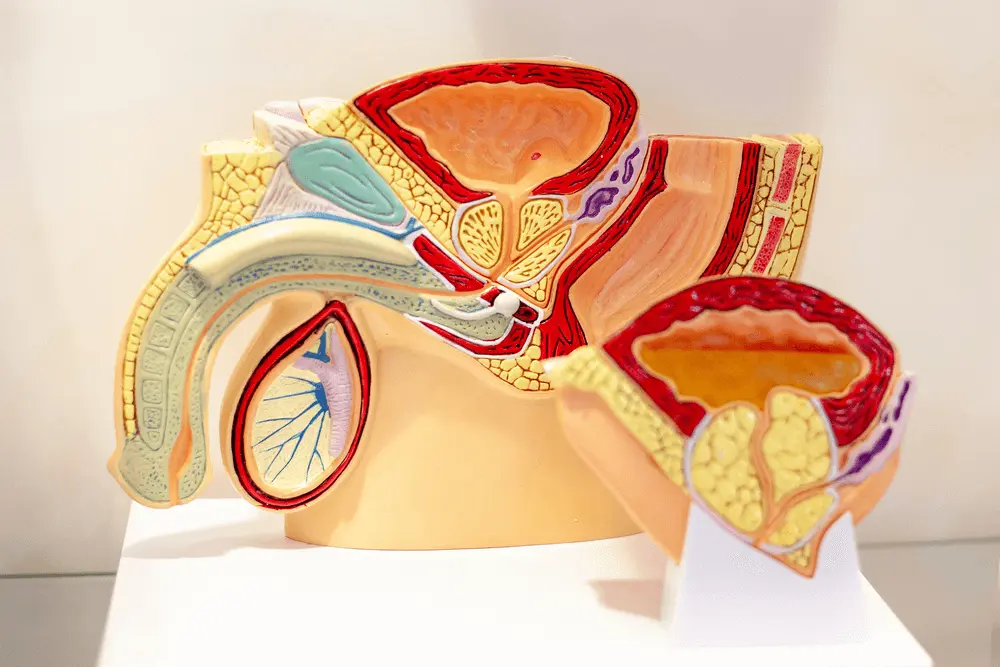Conversations around men’s health often focus on general well-being and fitness, while the topic of reproductive health is often overlooked. There are many aspects of men’s reproductive health that need to be understood and prioritised by all men because they affect not only family planning, but overall quality of life.
In this guide, we will discuss some important facets of men’s reproductive health, including vasectomy and fertility solutions. Our goal is to help you make informed decisions, whether you’re considering a vasectomy, dealing with fertility issues, or trying to improve your overall well-being.
It’s time to begin your journey toward improved reproductive health. Men’s Health Clinic Manitoba has the answers to your questions, and can provide the information you need to dispel myths and meet your goals. Let’s learn more about the various factors that affect men’s reproductive health.
Understanding Men’s Reproductive Health
One of the most important aspects of male reproductive health is the ability to father children. It’s one of the key factors that comes into play when it is time to start a family. Let us explain.
What Is Men’s Reproductive Health?
Here are some facets of life that are affected:
- Relationships: Having a healthy reproductive system can improve intimate relationships and sexual satisfaction.
- Family Planning: Reproductive health is essential to fertility and family planning.
- Self-Esteem: Fertility issues can affect a man’s self-esteem, especially when it affects sexual activity.
- Overall Well-Being: A healthy reproductive system can improve a man’s well-being.

What Factors Affect Male Reproductive Health?
Here’s what to consider about male reproductive health, especially when planning to start a family:
- Age: As men age, both the quality and quantity of sperm can decrease and fertility declines over time.
- Lifestyle Choices: Smoking, excessive alcohol consumption, drug use, and an unhealthy diet can have negative impacts on the male reproductive system and decrease fertility.
- Chronic Health Conditions: Chronic health conditions can also alter fertility. Diabetes, obesity, and hypertension can have deleterious effects.
- Genetics: Family history can affect fertility and the male reproductive system.
- Sexual Health: Safe sexual practices and regular sexual activity can play a role in maintaining a healthy reproductive system.
- Mental Health: The state of man’s mental health and stress levels can impact sexual function and reproductive health.

Vasectomy
A vasectomy is a big decision for a man to make. The procedure is one to consider as he ages because it takes away opportunities for fertility. Understanding a vasectomy, its purpose, and common misconceptions is important during the family planning process.
What Is a Vasectomy?
A vasectomy is a medical procedure that cuts or seals the vas deferens. These are the tubes that carry sperm from the testicles to the urethra. Men elect to have this procedure as a permanent form of contraception. It is a popular choice for men and couples who have completed their family planning or decided not to have children in the future.
Although it’s known to be permanent, it should be understood that a vasectomy doesn’t affect a man’s ability to enjoy sexual activity or experience orgasms. The goal is to stop sperm from entering the semen, thereby making the semen incapable of fertilizing an egg.

What Is the Vasectomy Procedure and Recovery Process?
Here is the information every man needs to know about the vasectomy procedure and recovery process.
Procedure
A vasectomy takes place under local anaesthesia in a healthcare provider’s office, such as the MHC Manitoba clinic. The doctor will make a small cut or perforation in the scrotum to gain access to the vas deferens. The tubes are then cut, sealed, or otherwise blocked to prevent sperm from travelling.
Recovery
The recovery process for a vasectomy is relatively straightforward. Men can return to normal activities within a few days to a week. After the procedure, discomfort, swelling, and bruising around the scrotal area are normal, and symptoms usually subside quickly. Following post-operative instructions is essential to a smooth recovery.
What Are the Pros and Cons of Vasectomy?
As with all procedures, a vasectomy has a set of advantages and disadvantages.
Pros
- Permanent Contraception: A vasectomy provides a long-term and highly effective method of contraception.
- No Hormonal Changes: Unlike some other forms of contraception, vasectomy doesn’t affect hormone levels or cause mood swings.
- Cost-Effective: Over time, a vasectomy is more cost-effective than ongoing expenses related to other contraception methods.
Cons
- Irreversible: A vasectomy is typically considered permanent, so it may not be the right choice if you plan to expand your family in the future.
- Recovery Period: The recovery period is relatively short, but essential to consider when planning the procedure.
- Effectiveness Delay: It takes time or a specific number of ejaculations to clear existing sperm from the reproductive tract. Backup contraception is required until your healthcare provider confirms that your semen is sperm-free.
Knowing the details of this procedure is essential. If you’re planning on getting a vasectomy, consider the repercussions that come with it. If you’re done with family planning, the procedure can be helpful. However, if you plan on growing your family, it might be best to hold off.

Fertility Solutions for Men
Fertility is essential to couples planning to start a family. Knowing what impacts male fertility and exploring potential solutions is important. Let’s review common causes of male infertility and discuss various fertility solutions available to men.
What Causes Male Infertility?
Male infertility can be attributed to a variety of factors. It’s important to recognize these causes as they play a significant role in fertility issues:
- Sperm Health: The quality and quantity of sperm affects fertility. Low sperm count, poor sperm motility and abnormal sperm morphology can be detrimental to conception.
- Medical Conditions: Certain medical conditions, such as varicocele (enlarged veins in the scrotum), infections, hormonal imbalances, and chronic illnesses, can affect fertility.
- Lifestyle Choices: Smoking, excessive alcohol consumption, drug use, obesity, and exposure to environmental toxins can affect sperm quality and fertility.
- Age: Although paternal age does not affect fertility as much as it does with women, it increases the chance of genetic anomalies in offspring.
What Lifestyle Changes Can Be Made To Improve a Man’s Sexual Health?
For those seeking to enhance fertility or address potential issues, lifestyle modifications can be an effective starting point. Here are ways to improve your fertility through lifestyle changes.
- Maintain a Healthy Diet: Eating a balanced diet rich in antioxidants, vitamins, and minerals can improve sperm health. Fruits, vegetables, whole grains and lean proteins should be a part of your meals.
- Exercise Regularly: Regular physical activity helps maintain a healthy body weight and improves overall health and fertility.
- Avoid Harmful Habits: Avoid smoking, limit alcohol consumption, and stay away from recreational drugs to protect sperm quality.
- Manage Stress: Did you know stress can affect your fertility? Meditation, yoga and mindfulness can help you relax.
What Medical Treatment Can Improve Male Fertility?
Sometimes, lifestyle changes will not change things enough. Medical treatments can also improve male fertility.
- Medications: Medications are available to correct hormonal imbalances and treat infections that impact fertility. Visit your doctor to determine if you’re experiencing reproductive issues.
- Assisted Reproductive Techniques (ART): Assisted reproductive techniques include intrauterine insemination (IUI) and in vitro fertilisation. These methods can be used in conjunction with other fertility treatments to increase the chances of conception.
- Surgery: Some surgical procedures address physical issues such as varicoceles or blockages in the reproductive tract.

Common Reproductive Health Issues
Reproductive health encompasses various aspects of the male reproductive system. While many men enjoy good reproductive health throughout their lives, common issues can arise. In this section, we’ll explore some of the most prevalent reproductive health issues that men may encounter.
Erectile Dysfunction (ED)
Erectile dysfunction (ED) is the inability to achieve or maintain an erection during sexual intercourse. The following factors can contribute to erectile dysfunction management.
- Physical factors: Such as diabetes, cardiovascular disease, obesity, or hormonal imbalances.
- Psychological factors: Such as stress, anxiety, depression, or relationship issues.
- Lifestyle factors: Such as smoking, excessive alcohol consumption, or drug use.
Understanding the underlying cause of ED is essential to effective treatment. Medications, therapy, lifestyle changes, or a combination of these can improve reproductive health.
Premature Ejaculation (PE)
Premature ejaculation occurs when a man ejaculates sooner than he or his partner desires during sexual intercourse. It can be linked to psychological factors, anxiety, or hypersensitivity. Treatment options include behavioural techniques, medications, or counselling.
Low Testosterone (Low T)
Low testosterone (Low T) can cause various symptoms, including reduced libido, fatigue, mood changes, and diminished muscle. Treatment options include hormone replacement therapy, lifestyle changes, and addressing underlying medical conditions.
Varicocele
Varicocele is the enlargement of veins in the scrotum, similar to varicose veins in the legs. It can potentially impact sperm production and quality, leading to fertility issues. Treatment options range from observation to surgical intervention.
Infertility
Infertility can affect men, and it’s often related to factors such as low sperm count, poor sperm motility, or abnormal sperm morphology. Seeking consultation with a fertility specialist is advisable if you’re experiencing difficulty conceiving.
Prostate Issues
Prostate problems, including benign prostatic hyperplasia (BPH) and prostate cancer, can impact reproductive health. Regular check-ups and early detection are essential for managing these conditions effectively.
Sexually Transmitted Infections (STIs)
Sexually transmitted infections, such as chlamydia, gonorrhoea, or syphilis, can affect reproductive health if left untreated. Practising safe sex and regular STI testing are crucial for prevention.
Understanding these common reproductive health issues and their potential causes is the first step toward proactive management and seeking appropriate medical advice when needed. In the subsequent sections of this guide, we’ll explore various aspects of men’s reproductive health, including family planning, lifestyle choices, and maintaining overall well-being.
Empowering Men for Reproductive Health
Congratulations! You’ve embarked on a journey through the intricacies of men’s reproductive health, from understanding the fundamental aspects to exploring specific concerns and solutions. As we conclude this comprehensive guide, let’s summarise the key takeaways and empower you with essential information for your reproductive health journey.
Now that you understand the importance of men’s reproductive health, it’s time to review the most significant aspects of the topic. Below are some of the things you should be aware of during the family planning process.
- Men’s Reproductive Health Matters: Not only is men’s reproductive health about fertility, it also affects overall well-being, sexual satisfaction, and family planning.
- Understanding Factors: Factors that affect fertility and men’s reproductive health include age, lifestyle choices, and medical conditions.
- Vasectomy: When finished with family planning, vasectomy is a safe and effective procedure worth exploring.
- Fertility Solutions: There are lifestyle changes, medical treatments, and assisted reproductive techniques that can enhance fertility and address certain issues.
- Holistic Approach: A combination of a balanced diet, regular exercise, and effective stress management can help you maintain your reproductive health.
- Consulting Specialists: Seeking guidance from reproductive health specialists is crucial for personalised evaluations, tailored treatments, and family planning advice.
Your Reproductive Health Journey
Your reproductive health journey is unique to you, and your choices should align with your goals and desires. Whether you’re considering vasectomy, striving to enhance fertility, or simply aiming to maintain optimal reproductive well-being, knowledge is your most potent tool.
Open communication with healthcare providers, specialists, and your partner is key. Your values, preferences, and individual needs should guide your journey.
Empowering You for Life
We hope you are empowered with the knowledge and confidence to make informed decisions about your reproductive health. Always remember that you can take charge of your well-being and make choices that positively impact your life.
As you progress on your reproductive health journey, stay proactive, stay informed, and prioritise your overall health and happiness.
If you have any further questions or require additional information, don’t hesitate to reach out to the team at Men’s Health Clinic Manitoba, which specialises in men’s reproductive health.






